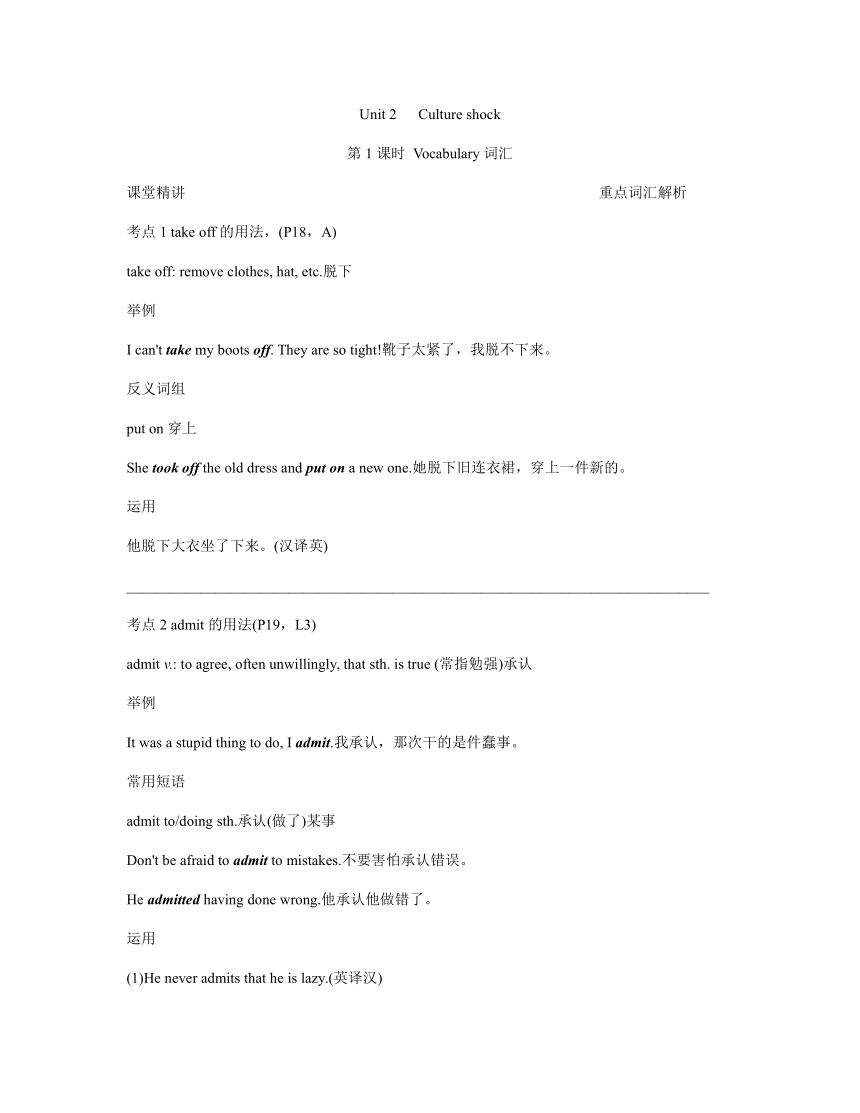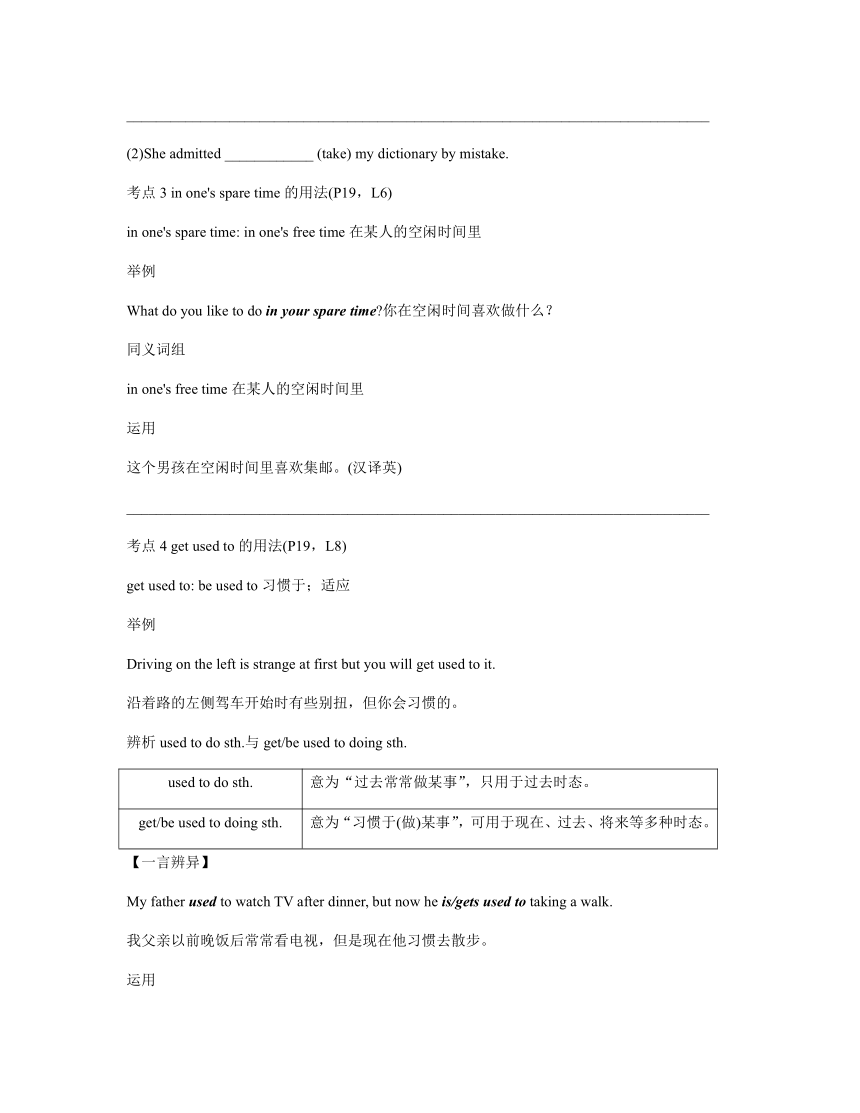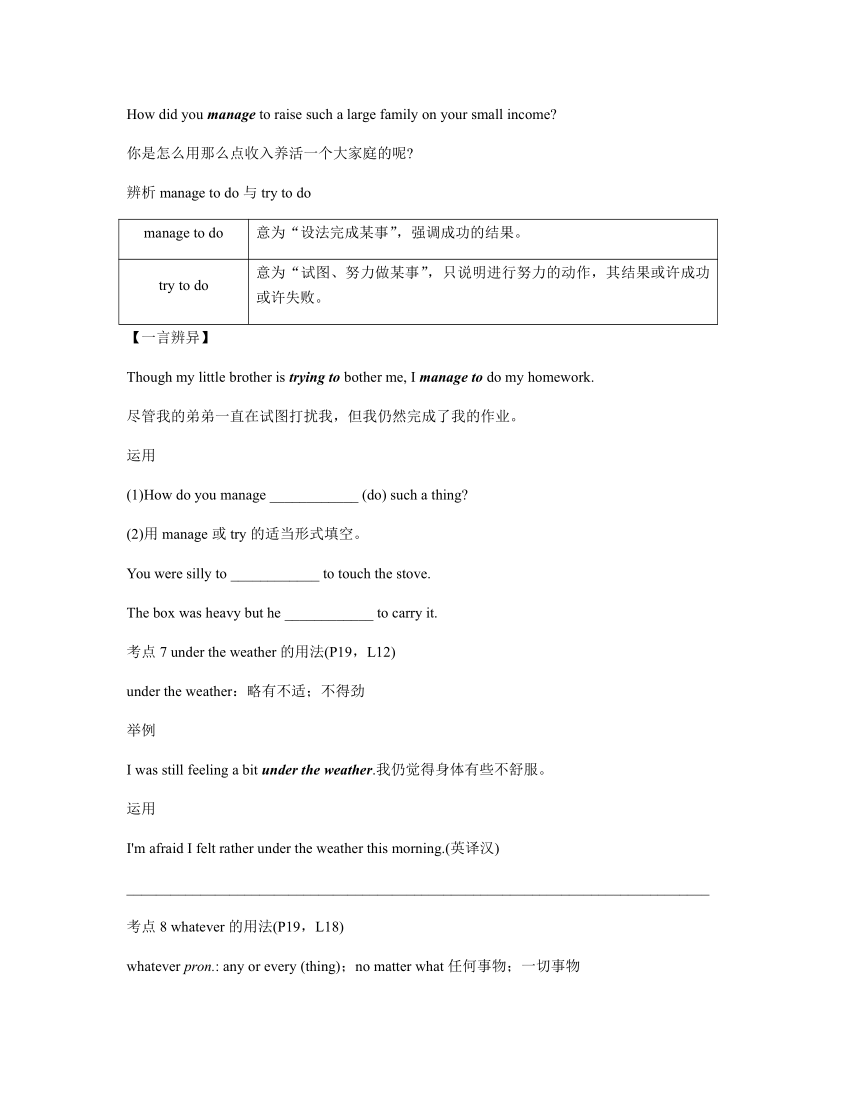牛津版(深圳 广州)英语九下 Unit 2 Culture shock 第1课时(Vocabulary词汇)导学案(无答案)
文档属性
| 名称 | 牛津版(深圳 广州)英语九下 Unit 2 Culture shock 第1课时(Vocabulary词汇)导学案(无答案) |  | |
| 格式 | doc | ||
| 文件大小 | 86.0KB | ||
| 资源类型 | 教案 | ||
| 版本资源 | 牛津深圳版 | ||
| 科目 | 英语 | ||
| 更新时间 | 2022-05-31 11:18:04 | ||
图片预览




文档简介
Unit 2 Culture shock
第1课时 Vocabulary词汇
课堂精讲 重点词汇解析
考点1 take off的用法,(P18,A)
take off: remove clothes, hat, etc.脱下
举例
I can't take my boots off. They are so tight!靴子太紧了,我脱不下来。
反义词组
put on穿上
She took off the old dress and put on a new one.她脱下旧连衣裙,穿上一件新的。
运用
他脱下大衣坐了下来。(汉译英)
_______________________________________________________________________________
考点2 admit的用法(P19,L3)
admit v.: to agree, often unwillingly, that sth. is true (常指勉强)承认
举例
It was a stupid thing to do, I admit.我承认,那次干的是件蠢事。
常用短语
admit to/doing sth.承认(做了)某事
Don't be afraid to admit to mistakes.不要害怕承认错误。
He admitted having done wrong.他承认他做错了。
运用
(1)He never admits that he is lazy.(英译汉)
_______________________________________________________________________________
(2)She admitted ____________ (take) my dictionary by mistake.
考点3 in one's spare time的用法(P19,L6)
in one's spare time: in one's free time在某人的空闲时间里
举例
What do you like to do in your spare time 你在空闲时间喜欢做什么?
同义词组
in one's free time在某人的空闲时间里
运用
这个男孩在空闲时间里喜欢集邮。(汉译英)
_______________________________________________________________________________
考点4 get used to的用法(P19,L8)
get used to: be used to习惯于;适应
举例
Driving on the left is strange at first but you will get used to it.
沿着路的左侧驾车开始时有些别扭,但你会习惯的。
辨析used to do sth.与get/be used to doing sth.
used to do sth. 意为“过去常常做某事”,只用于过去时态。
get/be used to doing sth. 意为“习惯于(做)某事”,可用于现在、过去、将来等多种时态。
【一言辨异】
My father used to watch TV after dinner, but now he is/gets used to taking a walk.
我父亲以前晚饭后常常看电视,但是现在他习惯去散步。
运用
Dale used to ____________ to office in his car, but he is used to ____________ a bus now.
A. going; taking B. going;take C. go;taking
考点5 fail的用法(P19,L9)
fail v.: be not successful in achieving sth.失败;未能(做到)
举例
If you don't work hard, you may fail.如果你不努力,你可能会失败。
拓展
failure n.失败;失败者
The success or failure of the plan depends on you.这项计划的成败取决于你。
常用短语
fail to do sth.未做/未履行(某事);做某事失败
He failed to keep the appointment.他未履约。
运用
(1)Jim was very sad because he ____________ the Maths examination.
A. passed B. failed C. succeeded
(2)He thought of himself as a ____________ (fail).
考点6 manage的用法(P19,L10)
manage v.: succeed in doing sth., especially sth. difficult完成(困难的事);勉力完成
举例
I don't know exactly how we'll manage it, but we will, somehow.
我说不准我们如何去完成这件事,但不管怎样我们一定会完成的。
常用短语
manage to do sth.设法完成某事
How did you manage to raise such a large family on your small income
你是怎么用那么点收入养活一个大家庭的呢
辨析manage to do与try to do
manage to do 意为“设法完成某事”,强调成功的结果。
try to do 意为“试图、努力做某事”,只说明进行努力的动作,其结果或许成功或许失败。
【一言辨异】
Though my little brother is trying to bother me, I manage to do my homework.
尽管我的弟弟一直在试图打扰我,但我仍然完成了我的作业。
运用
(1)How do you manage ____________ (do) such a thing
(2)用manage或try的适当形式填空。
You were silly to ____________ to touch the stove.
The box was heavy but he ____________ to carry it.
考点7 under the weather的用法(P19,L12)
under the weather:略有不适;不得劲
举例
I was still feeling a bit under the weather.我仍觉得身体有些不舒服。
运用
I'm afraid I felt rather under the weather this morning.(英译汉)
_______________________________________________________________________________
考点8 whatever的用法(P19,L18)
whatever pron.: any or every (thing);no matter what任何事物;一切事物
举例
I will do whatever you wish.我会对你言听计从。
Whatever happens, don't open the door.无论发生什么事,都不要开门。
运用
你可以买任何你想要的。(汉译英)
_______________________________________________________________________________
考点9 anyway的用法(P19,L20)
anyway adv.: anyhow无论如何;反正
举例
Anyway, let's forget about that for the moment.不管怎样,眼下别想这件事。
拓展
any way任何(一些)方法;任何方式
Do you know of any way to stop person snoring 你知道有什么方法可以阻止一个人打呼噜吗?
运用
(1)That's a bad habit of leaming. ____________, it is never too late for you to get out of it.
A. Instead B. Anyway C. Finally
(2)如果我能以任何方式帮助她,请告诉我。(汉译英)
_______________________________________________________________________________
考点10 especially的用法(P19,L20)
especially adv.: more in particular circumstances than in others尤其;特别
举例
Dennis is especially good at swimming.丹尼斯尤其擅长游泳。
I especially want to see that film.我特别想看那部电影。
辨析especially与specially
especially 通常表示“尤其;特别”,该词不用于句首。如:(√)I especially like sweet things.我特别喜欢吃甜食。(×)Especially I like sweet things.
specially 通常表示“特意地;专门地”,其后常接designed, developed或made等过去分词。如:She has her clothes specially made in Paris.的衣服是特意在巴黎定做的。
运用
(1)The sea is very beautiful, ____________ when sunshine overshines it.
A. instead B. especially C. similarly
(2)这是我专门为你准备的晚餐。(汉译英)
_______________________________________________________________________________
课堂精练
Ⅰ.根据句意及汉语提示完成句子
1. You can stay with us. We have a ____________ (空余的) room for you.
2. Christmas is a great festival, ____________ (尤其) for children.
3. I think it's difficult to do that, but let's have a try ____________ (无论如何).
4. These ancient buildings are part of the ____________ (民族的) heritage (遗产).
5. Why did you refuse to ____________ (承认) your mistake
6. Please show me the ____________ (日程安排) for next month.
7. We'll ____________ (勉力完成) to finish this job on time.
8. We must work hard together, or our plan will ____________ (失败).
9. I was on ____________ (假期) last week and didn't attend his birthday party.
10. ____________ (任何事物) you say, I will not go with you.
Ⅱ.用所给单词的正确形式填空
1. ____________ (Nation) Day is on October 1st each year.
2. I'm afraid I've ____________ (fail) the test in Chemistry.
3. Every language has its own ____________ (idiom).
4. She ____________ (admit) having done something wrong.
5. Dannie is ____________ (especial) good at swimming.
6. Most parents know the value of a good ____________ (educate).
Ⅲ.根据汉语意思,完成句子
1.当心点,别误将那些爆竹点燃。
Be careful that you don't ____________ the fireworks ____________ by mistake.
2.他走了进来,脱掉大衣。
He came in and ____________ ____________ his coat.
3.我在某种程度上同意你。
I agree with you ____________ ____________ ____________ ____________.
4.今天身体有点不适。
I feel a bit ____________ ____________ ____________ today.
5.他习惯散步的时候听音乐。
He ____________ ____________ ____________ listening to music while having a walk.
6.我在空闲的时间里喜欢看小说。
I enjoy reading novels ____________ ____________ ____________ ____________.
Ⅳ.阅读填空
请阅读全文,并从下列方框里的六个句子中选择五个还原到原文中,使原文的意思完整、连贯。
A. But why do tips exist B. Tipping well is a chance to show off.C. Only a few have really taken to tipping. D. The connection between larger tips and better service was very weak. E. It is believed that the better the service is, the bigger the tip will be.F. Do you know the rules for tipping
“Everybody hates it, but everybody does it.” A recent report said that 40% of Americans hate tipping. 1.____________
The common opinion in the past was that tips both rewarded the efforts of good service and reduced uncomfortable feelings of inequality (不平等). 2.____________
But according to a new research from Cornell University (康奈尔大学), tips no longer serve any useful function. The paper analyzes the data they got from 2,547 groups dining at 20 different restaurants. 3.____________
Tipping is better explained by culture than by the money people spend. In America, tipping is regarded as part of the accepted cost of a service. Hairdressers can expect to get 15%~20%. And the mall who delivers your fast food should be paid $2. In Europe, tipping is less common. In many Asian countries, tipping has never really caught on at all. 4.____________
According to Michael Lynn, the Cornell paper's author, countries in which people are more social or out-going tend to tip more. He says, “In America, where people are expressive and eager to mix up with others, tipping is about social approval. If you tip badly, people think less of you. 5.____________”
课后巩固 请完成《作业本》相关练习
第1课时 Vocabulary词汇
课堂精讲 重点词汇解析
考点1 take off的用法,(P18,A)
take off: remove clothes, hat, etc.脱下
举例
I can't take my boots off. They are so tight!靴子太紧了,我脱不下来。
反义词组
put on穿上
She took off the old dress and put on a new one.她脱下旧连衣裙,穿上一件新的。
运用
他脱下大衣坐了下来。(汉译英)
_______________________________________________________________________________
考点2 admit的用法(P19,L3)
admit v.: to agree, often unwillingly, that sth. is true (常指勉强)承认
举例
It was a stupid thing to do, I admit.我承认,那次干的是件蠢事。
常用短语
admit to/doing sth.承认(做了)某事
Don't be afraid to admit to mistakes.不要害怕承认错误。
He admitted having done wrong.他承认他做错了。
运用
(1)He never admits that he is lazy.(英译汉)
_______________________________________________________________________________
(2)She admitted ____________ (take) my dictionary by mistake.
考点3 in one's spare time的用法(P19,L6)
in one's spare time: in one's free time在某人的空闲时间里
举例
What do you like to do in your spare time 你在空闲时间喜欢做什么?
同义词组
in one's free time在某人的空闲时间里
运用
这个男孩在空闲时间里喜欢集邮。(汉译英)
_______________________________________________________________________________
考点4 get used to的用法(P19,L8)
get used to: be used to习惯于;适应
举例
Driving on the left is strange at first but you will get used to it.
沿着路的左侧驾车开始时有些别扭,但你会习惯的。
辨析used to do sth.与get/be used to doing sth.
used to do sth. 意为“过去常常做某事”,只用于过去时态。
get/be used to doing sth. 意为“习惯于(做)某事”,可用于现在、过去、将来等多种时态。
【一言辨异】
My father used to watch TV after dinner, but now he is/gets used to taking a walk.
我父亲以前晚饭后常常看电视,但是现在他习惯去散步。
运用
Dale used to ____________ to office in his car, but he is used to ____________ a bus now.
A. going; taking B. going;take C. go;taking
考点5 fail的用法(P19,L9)
fail v.: be not successful in achieving sth.失败;未能(做到)
举例
If you don't work hard, you may fail.如果你不努力,你可能会失败。
拓展
failure n.失败;失败者
The success or failure of the plan depends on you.这项计划的成败取决于你。
常用短语
fail to do sth.未做/未履行(某事);做某事失败
He failed to keep the appointment.他未履约。
运用
(1)Jim was very sad because he ____________ the Maths examination.
A. passed B. failed C. succeeded
(2)He thought of himself as a ____________ (fail).
考点6 manage的用法(P19,L10)
manage v.: succeed in doing sth., especially sth. difficult完成(困难的事);勉力完成
举例
I don't know exactly how we'll manage it, but we will, somehow.
我说不准我们如何去完成这件事,但不管怎样我们一定会完成的。
常用短语
manage to do sth.设法完成某事
How did you manage to raise such a large family on your small income
你是怎么用那么点收入养活一个大家庭的呢
辨析manage to do与try to do
manage to do 意为“设法完成某事”,强调成功的结果。
try to do 意为“试图、努力做某事”,只说明进行努力的动作,其结果或许成功或许失败。
【一言辨异】
Though my little brother is trying to bother me, I manage to do my homework.
尽管我的弟弟一直在试图打扰我,但我仍然完成了我的作业。
运用
(1)How do you manage ____________ (do) such a thing
(2)用manage或try的适当形式填空。
You were silly to ____________ to touch the stove.
The box was heavy but he ____________ to carry it.
考点7 under the weather的用法(P19,L12)
under the weather:略有不适;不得劲
举例
I was still feeling a bit under the weather.我仍觉得身体有些不舒服。
运用
I'm afraid I felt rather under the weather this morning.(英译汉)
_______________________________________________________________________________
考点8 whatever的用法(P19,L18)
whatever pron.: any or every (thing);no matter what任何事物;一切事物
举例
I will do whatever you wish.我会对你言听计从。
Whatever happens, don't open the door.无论发生什么事,都不要开门。
运用
你可以买任何你想要的。(汉译英)
_______________________________________________________________________________
考点9 anyway的用法(P19,L20)
anyway adv.: anyhow无论如何;反正
举例
Anyway, let's forget about that for the moment.不管怎样,眼下别想这件事。
拓展
any way任何(一些)方法;任何方式
Do you know of any way to stop person snoring 你知道有什么方法可以阻止一个人打呼噜吗?
运用
(1)That's a bad habit of leaming. ____________, it is never too late for you to get out of it.
A. Instead B. Anyway C. Finally
(2)如果我能以任何方式帮助她,请告诉我。(汉译英)
_______________________________________________________________________________
考点10 especially的用法(P19,L20)
especially adv.: more in particular circumstances than in others尤其;特别
举例
Dennis is especially good at swimming.丹尼斯尤其擅长游泳。
I especially want to see that film.我特别想看那部电影。
辨析especially与specially
especially 通常表示“尤其;特别”,该词不用于句首。如:(√)I especially like sweet things.我特别喜欢吃甜食。(×)Especially I like sweet things.
specially 通常表示“特意地;专门地”,其后常接designed, developed或made等过去分词。如:She has her clothes specially made in Paris.的衣服是特意在巴黎定做的。
运用
(1)The sea is very beautiful, ____________ when sunshine overshines it.
A. instead B. especially C. similarly
(2)这是我专门为你准备的晚餐。(汉译英)
_______________________________________________________________________________
课堂精练
Ⅰ.根据句意及汉语提示完成句子
1. You can stay with us. We have a ____________ (空余的) room for you.
2. Christmas is a great festival, ____________ (尤其) for children.
3. I think it's difficult to do that, but let's have a try ____________ (无论如何).
4. These ancient buildings are part of the ____________ (民族的) heritage (遗产).
5. Why did you refuse to ____________ (承认) your mistake
6. Please show me the ____________ (日程安排) for next month.
7. We'll ____________ (勉力完成) to finish this job on time.
8. We must work hard together, or our plan will ____________ (失败).
9. I was on ____________ (假期) last week and didn't attend his birthday party.
10. ____________ (任何事物) you say, I will not go with you.
Ⅱ.用所给单词的正确形式填空
1. ____________ (Nation) Day is on October 1st each year.
2. I'm afraid I've ____________ (fail) the test in Chemistry.
3. Every language has its own ____________ (idiom).
4. She ____________ (admit) having done something wrong.
5. Dannie is ____________ (especial) good at swimming.
6. Most parents know the value of a good ____________ (educate).
Ⅲ.根据汉语意思,完成句子
1.当心点,别误将那些爆竹点燃。
Be careful that you don't ____________ the fireworks ____________ by mistake.
2.他走了进来,脱掉大衣。
He came in and ____________ ____________ his coat.
3.我在某种程度上同意你。
I agree with you ____________ ____________ ____________ ____________.
4.今天身体有点不适。
I feel a bit ____________ ____________ ____________ today.
5.他习惯散步的时候听音乐。
He ____________ ____________ ____________ listening to music while having a walk.
6.我在空闲的时间里喜欢看小说。
I enjoy reading novels ____________ ____________ ____________ ____________.
Ⅳ.阅读填空
请阅读全文,并从下列方框里的六个句子中选择五个还原到原文中,使原文的意思完整、连贯。
A. But why do tips exist B. Tipping well is a chance to show off.C. Only a few have really taken to tipping. D. The connection between larger tips and better service was very weak. E. It is believed that the better the service is, the bigger the tip will be.F. Do you know the rules for tipping
“Everybody hates it, but everybody does it.” A recent report said that 40% of Americans hate tipping. 1.____________
The common opinion in the past was that tips both rewarded the efforts of good service and reduced uncomfortable feelings of inequality (不平等). 2.____________
But according to a new research from Cornell University (康奈尔大学), tips no longer serve any useful function. The paper analyzes the data they got from 2,547 groups dining at 20 different restaurants. 3.____________
Tipping is better explained by culture than by the money people spend. In America, tipping is regarded as part of the accepted cost of a service. Hairdressers can expect to get 15%~20%. And the mall who delivers your fast food should be paid $2. In Europe, tipping is less common. In many Asian countries, tipping has never really caught on at all. 4.____________
According to Michael Lynn, the Cornell paper's author, countries in which people are more social or out-going tend to tip more. He says, “In America, where people are expressive and eager to mix up with others, tipping is about social approval. If you tip badly, people think less of you. 5.____________”
课后巩固 请完成《作业本》相关练习
